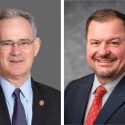UW–Madison Public Records Custodian Julie Laundrie on the importance of Sunshine Week
Julie Laundrie has a lengthy and deep understanding of Wisconsin’s open records law. The former public records custodian at the Madison Police Department, Laundrie joined the University of Wisconsin–Madison’s Office of Compliance in December to lead the university’s public records unit.
At MPD, she led a team that handled a high volume of requests from media and citizens seeking investigative reports, data and personnel records. She holds a bachelor’s degree in public administration from UW-Green Bay and has a graduate certificate from Edgewood College in urban and rural economic development.

Julie Laundrie
“We are excited to have Julie join our public records team. She brings a wealth of experience in dealing with a high volume of complex requests and working closely with colleagues to ensure the timely and thoughtful release of records,” says Jaimee Gilford, director of the Office of Compliance. “Wisconsin has some of the most robust open records laws in the nation, and we are committed to meeting those requirements with each request we receive.”
Laundrie was hired through a search process following the retirement of Lisa Hull, who served as public records custodian since 2012. Laundrie teams with Assistant public Records Custodian Elizabeth Wilkerson and Office of Compliance and Office of Legal Affairs colleagues to respond to all requests received by the university, which numbered just under 700 in calendar year 2023.
“Having more than five years of experience, Elizabeth is a great asset to the records group and UW–Madison in general,” Laundrie says. “I am grateful to be able to work together building the team looking ahead.”
March 10-16 is national Sunshine Week, which was first established in 2010 to raise awareness of the importance of the Freedom of Information Act and the importance of government transparency. Wisconsin has some of the broadest public records laws in the nation, and, as a state institution, UW–Madison is subject to the Wisconsin public records law.
Below is a Q&A with Laundrie about UW–Madison’s public records process and the requirements of public employees under Wisconsin law.
Q: You’ve spent a good portion of your career working with public records. What interests you about the work, and why is it important to have transparency in public data?
A: I am interested in building trust with the community, and public records are a path to achieve that goal. I am a firm believer in the great equalizer of valuable public structures like UW–Madison. Transparency and access to public records help build that trust.
Q: How would a person submit a public records request to UW–Madison?
A: Public records requests made to UW–Madison are received through a public portal and can be made anonymously.
Q: What are some of the misconceptions people have about public records and UW–Madison’s requirements under the law?
A: It is common to receive a request that lacks specificity. A records custodian should not have to guess what records are being sought. We spend a lot of time working with requestors to try to form what they want into a request for actual records, not just a request for information. For me that is just an opportunity for dialog about the law, and it is a big part of our job.
Q: The image, fairly or unfairly, is of the government either concealing information or taking a long time to provide it. Does it take a long time? If so, why?
A: UW–Madison has a high volume of complex public records requests. Often, it can take time to obtain records from the corner of campus where the requested records live. Our communications with requestors explain timeline challenges and why some records may be redacted or denied. We process requests every single day; this is our primary job, and I am proud to be a part of this team.
Q: What types of information are people asking for?
A: People request specific documents like contracts and purchasing records. There are often requests for data. Requests from the media are always pending. I would also categorize a patch of requests as ideological; people that care about a specific topic and seek different records to obtain information about that topic.
Q: What should I do if I receive a public records request?
A: University employees who receive a public records request should direct the requestor to the Office of Compliance’s Wisconsin public records page. Employees should also let the requestor know they cannot personally reply to a request for records. A simple Google search will lead anyone to our website if an employee does not have the link in pocket.
Q: Are there exceptions that apply to public employees when it comes to information that is releasable under the law? What are they?
A: Employees have special rights to view certain records about themselves, specifically many personnel records. The law also contains exceptions explaining where employees are not guaranteed access, like staff planning documents, letters of reference and others. At UW–Madison, an employee’s request for their own personnel records should be made at the school-, college- or division-level human resources office, rather than through the public records office.
Employees also have a right to be notified if the university is going to release very specific types of records about them. This right is limited and is more the exception than the rule. For the most part, the law demands that we release records as soon as possible and that no notice is required. While this can feel stressful, it is a part of the overall function of open government.
Q: Do you have plans to raise awareness among faculty and staff on responsibilities under Wisconsin’s public records law?
A: Yes! A big part of this job now is going to be raising awareness through communications like this. We will also train all over campus and have plans to create additional supportive materials for our employees. UW–Madison is a public institution, so employees should understand any records related to their work are public and can be requested at any time. That said, the public records office works with employees every day to help them understand and navigate if there is a request for records connected specifically to the employee. We hope to raise our profile as a resource on campus, which could lead to effective public records hygiene and a stronger understanding of Wisconsin’s public records laws.
Tags: employee news, leadership, sunshine week



